The Ultimate Guide to Mobile App Marketing

Table of Contents
- Mobile App Marketing vs. Mobile Marketing: The Difference
- The Mobile App Marketing Funnel
- Uses of Mobile App Marketing
With hundreds of millions of smartphone users globally, mobiles have become an integral part of our lives. These days, mobile apps are increasingly used to meet various day-to-day objectives. As a result, mobile app marketing has become a crucial factor in employing different techniques to attract, engage and retain app users. Let’s learn more.
Mobile app marketing involves building a strategy where the main objective is to attract target users and retain them with the mobile app. This marketing technique aims to increase the overall lifetime value of the mobile app.
Mobile app marketing comprises five significant phases:
- Awareness
- Consideration
- Conversion
- Customer relationship
- Retention
This form of marketing is a continuous process where you acquire new customers using the five stages mentioned above and ensure long-term engagement. Mobile app marketing has become relevant today because more than 65% of small businesses have their dedicated mobile app, and there is serious competition.
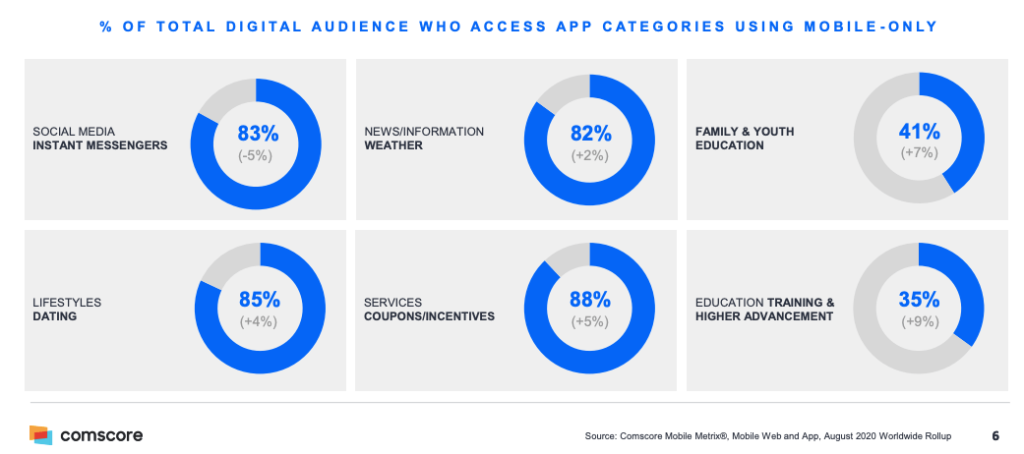
The magic of mobile app marketing lies in the fact that most people can’t stay away from their smartphones. Like the Gollum in The Lord of the Rings trilogy, people detest staying away from their “precious thing” called the mobile that helps them connect with the rest of the world and offers updated information.
This detailed guide will delve deeper into mobile app marketing and help you understand its importance and benefits. Also, you get all the information to market your app successfully. So, without further ado, let’s get started.
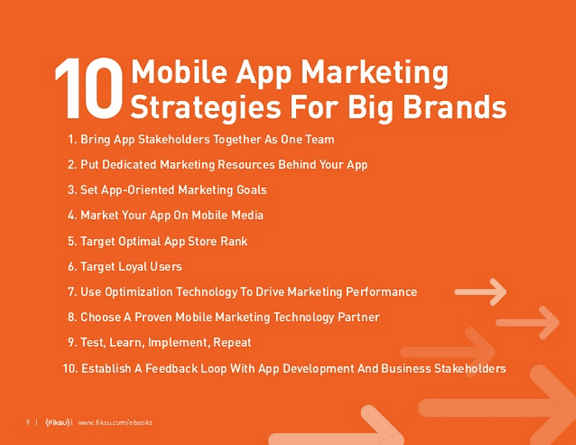
Mobile App Marketing vs. Mobile Marketing: The Difference
How often do we mistakenly believe that mobile app marketing and mobile marketing are the same? Both marketing strategies fulfill similar purposes like product promotion and services, but there are striking differences between the two.
While the basic skeleton of the mobile website and mobile app marketing looks identical, there are significant differences when analyzing them closely. In fact, there is an altogether different marketing plan for both when it comes to the nitty-gritty. So, let’s drill down further to understand the differences between mobile app marketing and mobile marketing.
1. The KPIs are different
While analyzing the website performance, there are several things to consider, like page load times, conversion rate, average time spent on the page, bounce rate, and page views.
The website KPIs are many, and they depend on what you wish to achieve from a particular mobile site. The mobile app marketing KPIs include installation progression, churn, and retention rate, which measure how many people stopped using the app after a specific time.
2. You require different strategies
You need a good SEO (search engine optimization) technique to rank the site higher in Google rankings and drive organic traffic to promote a mobile website.
The mobile app equivalent for SEO is App Store Optimization or ASO. It would help if you have proper strategies to get your app noticed among millions, and ASO can help you here.
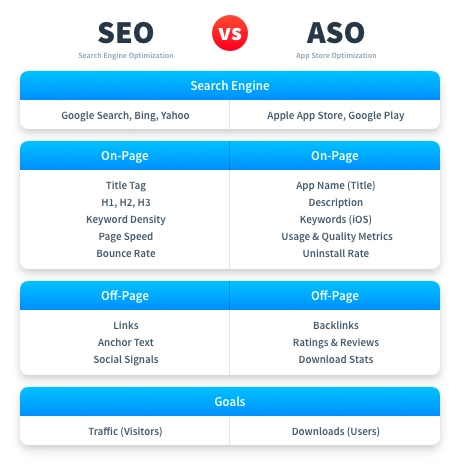
Also, to monetize a mobile website, you have to rely on ad sense, content discovery, and product purchase. For mobile app monetization, you need to implement incentives for the purchase and real-life merchandise strategies.
3. Continued engagement
The main goal of mobile website marketing is to increase Google search rankings and convert users into customers. Mobile app marketing works on convincing users to download the app on their smartphones and make them useful for a more extended period.
The person concerned is always encouraged to use the app, and mobile app marketing pulls them back if they stop using the app after a certain period.
4. Users behave in different ways.
Interestingly, more than 80% of mobile activity occurs in apps, and the rest on mobile websites.
For example, people tend to research flights and prices on the mobile app before making the final purchase using their desktop or tablet. The difference in user behavior profoundly impacts the app or mobile website’s different customer journeys.
5. They have different formats.
The mobile website uses an external server that is accessible to anyone from anywhere, while you need to download the mobile app on your smartphone for personal use.
Mobile web marketing aims to convince people to complete a particular action like a product purchase or appointment booking. Therefore, the first goal of mobile app marketing is to download the app and have continuous engagement.
While marketing the mobile site, you just have to worry about increasing its visibility and nurturing the customer across the overall journey on the site. On the other hand, mobile app marketing convinces users to download the app and minimizes the churn out rate by keeping the users engaged.
6. The marketing funnel
As discussed earlier, mobile app marketing involves installing the app on the user’s smartphone and engaging with it. Therefore, the app acquisition occurs at the early stage of the marketing funnel. But, for the mobile website, the conversion (whether the purchase, demonstration or request, or any such action) is usually the last stage.
The Mobile App Marketing Funnel
The mobile app marketing funnel, also known as the sales or purchase funnel, is a model that breaks down different stages of the user journey. It starts with creating awareness about the product or service and ends with converting prospective users into long-term customers. The stages may vary from one industry to another, but the overall marketing funnel represents the same process of awareness, consideration, conversion, and retention.
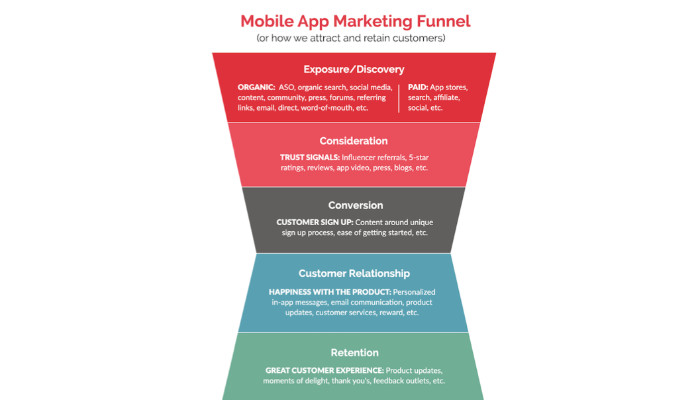
- How the mobile app marketing funnel works
As mentioned earlier, the marketing funnel stages might look different for different industries, but the overall goal is the same – turning users into prospective customers. Whether registering for a free trial, signing up for product updates, or purchasing a product, the objective is to make the conversion.
Lewis developed the original model of the marketing funnel, and it comprises four different stages:
- Awareness
- Consideration
- Conversion
- Building customer relationships
Over the years, these four stages have evolved to adjust to the modern markets. For example, mobile app marketers employ different strategies to lure users’ attention towards the product, brand, or business in the first stage.
The strategies include email marketing, referral marketing, social media advertisement, and other tactics to promote mobile apps. As the customer progresses through the funnel into the latter stages, many would exit, and the number of prospective users would decline. The more leads generated, the greater the customer retention at the end.
The traditional marketing funnel developed by Lewis has been quite effective for sales and marketing professionals for over a hundred years and is still widely used today. It is interesting to note that the marketing funnel was not developed initially for mobile marketing. However, the overall layout and stages are similar between the traditional funnel and the current mobile app marketing funnel.
In recent times, the mobile app marketing funnel is not a linear and straightforward process anymore. The customer journey today is instead individualized and complex. Moreover, with a plethora of resources available for user consumption, the customer’s decision-making journey is much faster than the traditional funnel.
- Importance of the mobile app marketing funnel
The primary purpose of marketing and advertising has always been to convert potential leads into final acquisitions. The mobile app marketing funnel is a handy tool to guide this process.
With the advent of mobile technologies and the rise of social media, they have given companies and brands new powerful channels to reach out to potential customers.
By understanding the tactics and strategies employed in the mobile app marketing funnel, companies now have the advantage of staying competitive in saturated industries. Therefore, mobile app marketers must get acquainted with the user map journey and correlate it with the marketing funnel.
With numerous channels like online reviews and social media now available at the users’ fingertips, many won’t even enter the first stage of the marketing funnel. Good leads will join in the mid-stage and fruitfully convert into prospective customers.
Regardless of where the individual enters the funnel, it is imperative to employ an onboarding process to retain the users for a long time.
Uses of Mobile App Marketing
At present, there are more than 5 billion unique smartphone users globally. The number of people who own a device and use it to access the internet is continuously growing. So, what does this data tell us?
We should start paying more attention to mobile app marketing. No matter what sort of business you own or the service you provide, mobile app marketing is the need of the hour. It can open new doors to customer acquisitions and building brands.
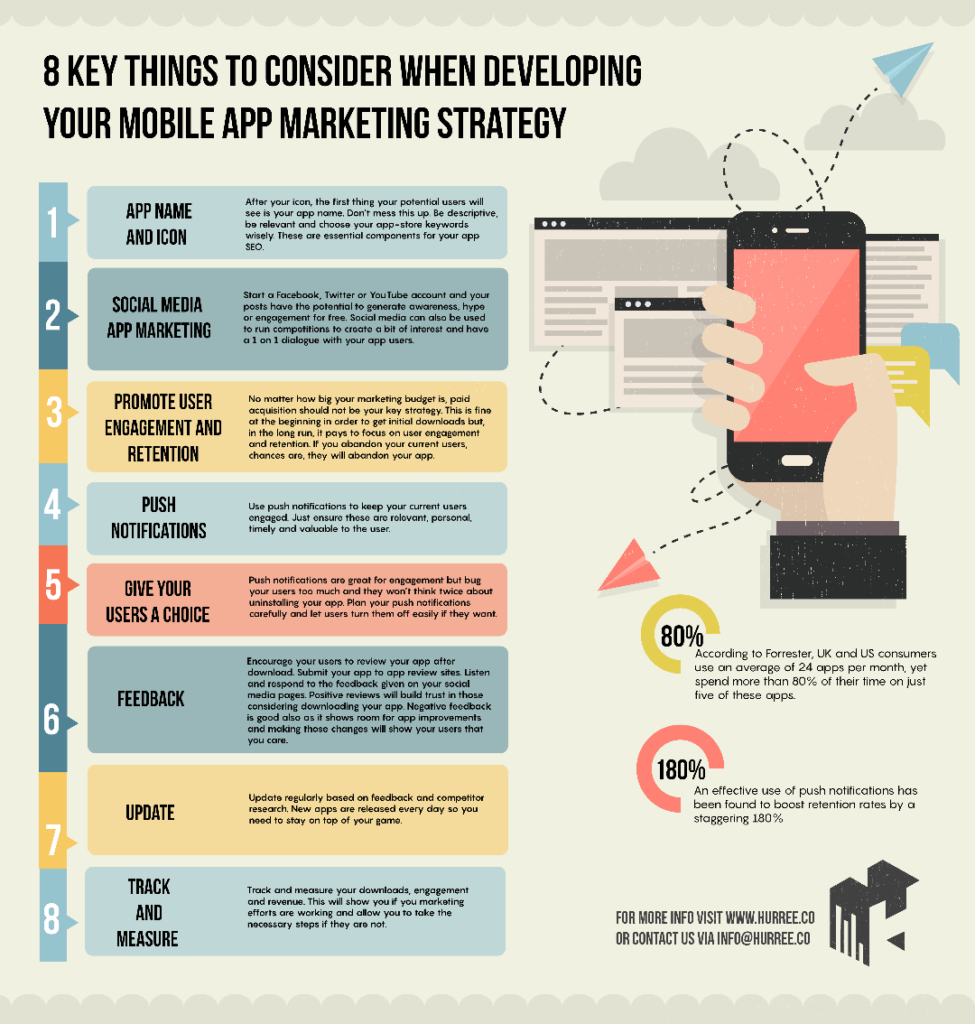
This form of marketing can help reach out to a broader customer base and is cost-effective at the same time. Are you thinking about how mobile app marketing can help grow your business? Here are the different mobile app marketing uses that can benefit your business or service in 2022.
1. Valuable customers
The business landscape has changed significantly over the past decade. Now business owners rely on technology to carry out transactions with customers. Mobile apps are the indisputable elements of the modern world, and it goes a long way toward satisfying the needs of consumers.
By implementing mobile app marketing, you can offer your products or services to a more extensive consumer base and get valuable customers in the long run. At the same time, you can build a strong brand, improve customer loyalty and offer better service in return.
2. Strong brand
When you increase the customer base, they will have more interest in your brand. But it is not possible to offer an in-depth brand experience to customers without putting deliberate efforts upfront. This is where mobile app marketing comes into action.
This form of marketing can undoubtedly improve brand awareness and help develop a flourishing relationship between the business and the consumer. Moreover, you can expect better brand marketing results by improvising better branding elements (color combination and logos) in your mobile app.
3. Connect with customers
If one single thing genuinely influences consumer satisfaction, it is the accessibility of information about a particular business. Often, the deciding factor between a lead and conversion is the response speed of the customer support.
With proper mobile app marketing, you can deliver appropriate communication to the customers and help serve the clients faster and better.
4. Location
One of the most significant uses of mobile app marketing is targeting customers based on their location. It is a massive benefit any business can reap. People carry their smartphones every place they travel.
The geo-target feature of mobile devices can be of great help. With mobile app marketing, you can send location-specific ads that are user-relevant. You can also use the geofencing feature to trigger coupons, alerts, notifications, and other offers when users enter a particular location.
5. Cost-effective
Mobile app marketing is way cheaper and more affordable compared to traditional marketing techniques. The ad clicks from smartphones are 24% cheaper than from laptops or desktop PCs.
Optimizing the mobile apps to send messages or notifications to the customers is less expensive and ideal for a small business that doesn’t have a huge marketing budget.
6. More personal
Smartphones have become a massive part of our lives. They are an extension of users who constantly check their devices for notifications and help keep people updated about what’s happening around them.
An individual’s information on their smartphone is more personal than on the PC or desktop. This is what marketers can use to their advantage by implementing personal and intimate marketing campaigns to yield incredible results.
7. Better purchasing decisions
People who regularly use smartphones always crave convenience and immediacy. These people are always on the lookout for a business, access it, find discounts, make payments, and lots more.
All they want is to have a smoother and richer experience in the end. With proper mobile app marketing, you can provide a positive mobile experience to people. For example, 60% of people are less likely to purchase an item if they read negative reviews on their smartphones.
At the same time, a positive mobile experience can increase offline purchases, too. Around 70% of mobile users are likely to use their smartphone to get info about a product and purchase it from a store.
As we move further into the world of mobile app marketing, it can be both overwhelming and exciting when you think about its potential. If you are looking to improve your business, build a better brand, and significantly enhance profits, mobile app marketing might just be the missing link. Today, smartphone devices power most online traffic. So using proper mobile app marketing can undoubtedly put the business in the right direction and help leverage the trend.
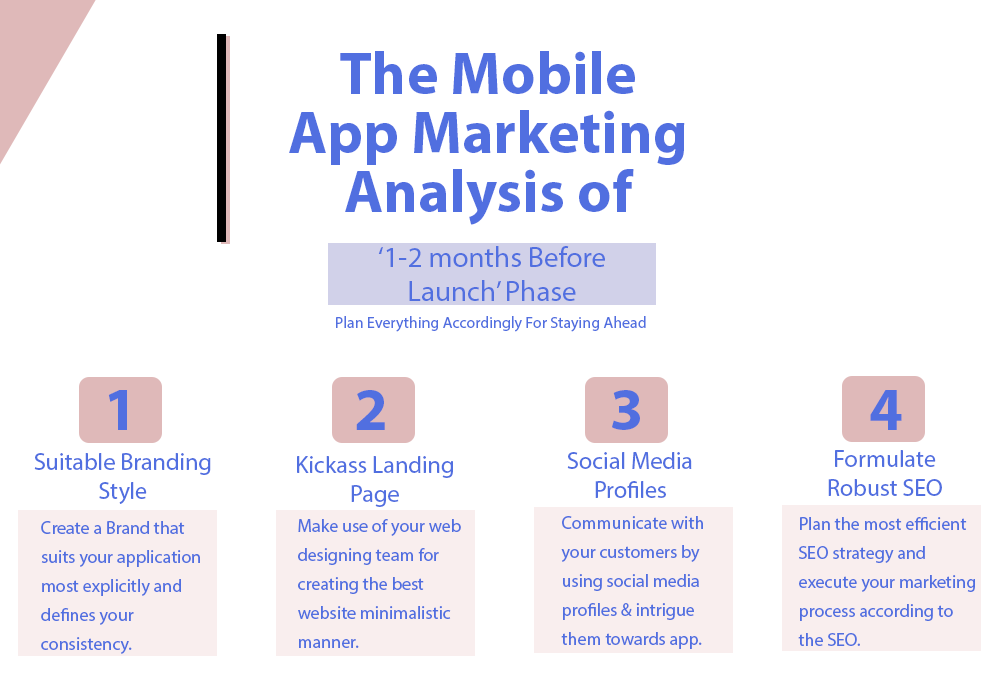
All this can be achieved from branding to customer acquisition and marketing to booking overall profits by implementing proper mobile app marketing. It is cost-effective and highly beneficial for new startups with significantly lower marketing budgets.
Mobile app marketing is here to stay and will continuously evolve in the coming time. Different strategies can be used to bring potential customers and retain existing ones with the help of mobile app marketing.
So, have you adopted this innovative marketing strategy for your business yet? If not, it’s high time you gave it a try, and you can start reaping the benefits shortly.

Key Takeaways
- Easy accessibility, distinct offerings, and constant connectivity with updated features
- It is cost-effective and can quickly help create brand awareness in a short time.
- Able to reach a large customer base globally and retain good consumers
- Able to target prospective customers using geotagged locations
- Use mobile app marketing funnel for increasing profitability
- Added user convenience and better purchasing decisions
FAQs
Smartphones are the most personal and intimate media platforms that people possess in today’s time. Using them as a marketing platform can help your business reach new heights, better brand awareness, and have good customer retention.
With smartphones, the viewing and reading habits of people have changed considerably. As a result, a lot of info is thrown at us, and we cannot keep all our attention. Therefore, it’s essential to keep the messages and notifications short and to the point to grab the user’s attention.
Search engines like Google provide information to people on the go. The mobile apps allow the companies to be found in local searches.
YellowPages, Yelp and FourSquare are some of the different mobile apps that put your business on the local map with the help of SEO on smartphone devices.
Latest Blogs
Learn how to rank on AI search engines like ChatGPT, Perplexity, and Gemini by optimizing your content for authority, structure, and relevance. Stay ahead in AI-driven search with this strategic guide.
Explore the best healthcare SEO services for your medical practice. Improve online visibility and effectively reach more patients in need of your services.
Discover top social media agencies specializing in banking solutions, enhancing financial services and driving engagement.
Get your hands on the latest news!
Similar Posts

Artificial Intelligence
5 mins read
Enhance Your Writing Efficiency: Must-Have Content Writing Tools for Marketers

Marketing
5 mins read
9 Key Strategies To Increase Twitter Reach

Marketing
6 mins read